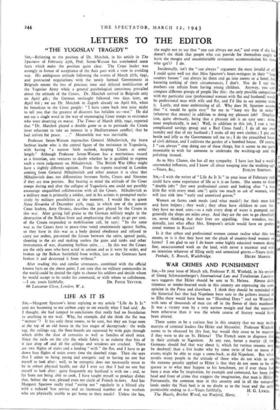"THE YUGOSLAV TRAGEDY"
LETTERS TO THE EDITOR
SIR,—Referring to the position of Dr. Matchek, in his article in The Spectator of February 25th, Prof. Seton-Watson has overlooked some
facts which make the position quite clear. The Croat leader was strongly in favour of acceptance of the Axis pact with a view to avoiding war. His ambiguous attitude following the events of March 27th, 1941, and protracted negotiations with the newly formed Government in Belgrade meant the loss of precious time and delayed mobilisation of the Yugoslav Army while a general psychological uneasiness prevailed about the attitude of the Croats. Dr. Matchek arrived in Belgrade only on April 4th ; the German onslaught followed two days later, on April 6th ; we see Dr. Matchek in Zagreb already on April 8th, when he broadcast to the Croat people: "I have come back into your midst to tell you that the greatest of disasters has befallen us—war." He did not say a single word in the way of encouraging Croat troops to resistance who were deserting en masse. The Times of March 28th, 1945, reported that "Dr. Matchek played a double game so as to persuade the Croats (ever reluctant to take an interest in a Mediterranean conflict) that he had striven for peace. . ." Meanwhile war was inevitable.
Professor Seton-Watson reproaches General Mihajlovitch, the brave Serbian leader who is the central figure of the resistance in Yugoslavia, with having "a narrow Serb outlook, keeping Croats at arms' length." Although Professor Seton-Watson has a meritorious record as a historian, one ventures to doubt whether he is qualified to express such a stern judgement on Mihajlovitch. The British War Office might have a slightly different opinion. From the reports received in London coming from General Mihajlovitch and other sources it is clear that Mihajlovitch does not differentiate between Serbs, Croats and Slovenes if they are true patriots. But bearing in mind the attitude of the Croat troops during and after the collapse of Yugoslavia one could not possibly encourage unqualified collaboration with all the Croats. Mihajlovitch as a military man is primarily a soldier, and in his actions is prompted exclu- sively by military possibilities at the moment. I would like to quote Nova Hrvatska of December 25th, 5942, in which one of the present Croat leaders, Ante Orsanic, describes the part played by the Croats in this war. After giving full praise to the German military might in the destruction of the Balkan front and emphasising that only 30-40 per cent. of the Croats responded to mobilisation call, he says: "In the same way as the Croats have in peace-time voted unanimously against Serbia, so they have in this -war as a body denied obedience and refused to carry out orders, prevented the liaison between the units, spread panic, shooting in the air and making useless the guns and tanks and other instruments of war, disarming Serbian units. . . . In this war the Croats are the only ones who have acted in unison and as it were by order, and broken up the Balkan battlefield from within, just as the Germans have broken it and destroyed it from without."
After reading this and similar utterances, combined with the official known facts on the above point, I am sure that no military commander in the world could be denied the right to choose his soldiers and decide whom he would accept to be under his command, or with whom to collaborate.


























 Previous page
Previous page